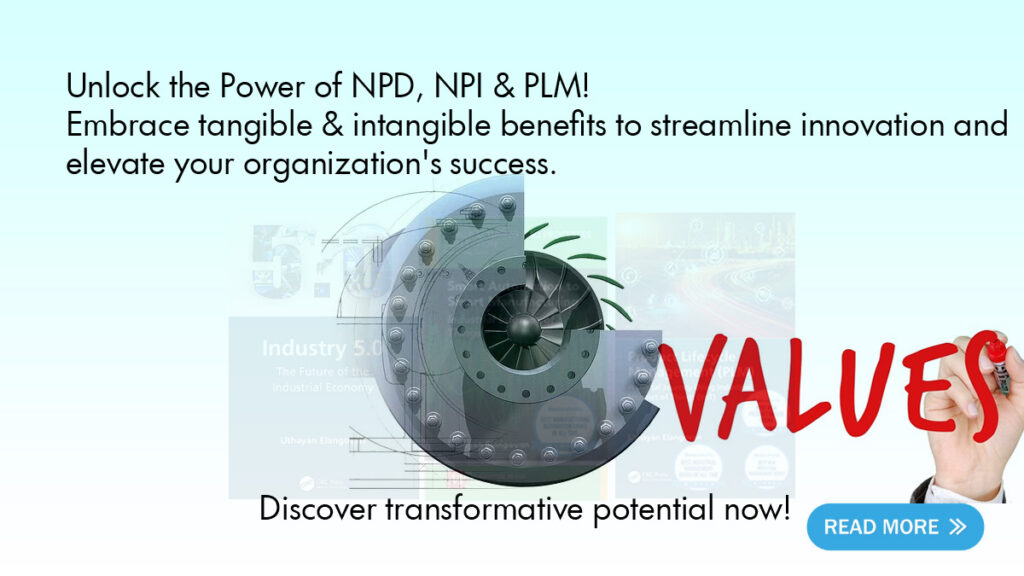Discover the transformative potential of NPD and NPI with PLM, uncovering both tangible and intangible benefits for your manufacturing organization. Streamline innovation and elevate success.

Introduction:
Staying ahead of the competition requires continuous innovation and the ability to bring new products to market swiftly in the world of manufacturing. New Product Development (NPD) and New Product Introduction (NPI) play a pivotal role in this process. In recent times, businesses have sought to optimize these processes through automation, leveraging the power of Product Lifecycle Management (PLM). Let’s explore how automation through PLM can streamline NPD and NPI processes from the ground up, involving different cross-functional team members. Additionally, we will delve into both the tangible and intangible benefits that PLM implementation offers.
Understanding New Product Development and New Product Introduction
New Product Development is the comprehensive process of creating, designing, and engineering a new product or service from conception to market launch. It involves research, ideation, prototyping, testing, and refining the product before it is introduced to the market. On the other hand, New Product Introduction refers to the stage where the product transitions from development to production, encompassing manufacturing planning, supply chain management, quality assurance, and marketing strategies.
Challenges in Traditional NPD and NPI
Traditional NPD and NPI processes often face various challenges, including:
- Fragmented Communication: Disconnected communication channels between departments lead to misalignment, delays, and a lack of synergy in product development.
- Data Silos: Critical product information scattered across different platforms hinders efficient decision-making and collaboration.
- Manual Workflows: Reliance on manual processes lengthens development cycles, increases the risk of errors, and impedes innovation.
- Compliance Issues: Ensuring compliance with industry regulations and standards can be cumbersome and time-consuming.
Automating NPD and NPI with PLM
- Cross-Functional Collaboration: Implementing PLM encourages close collaboration among various teams, including design, engineering, marketing, procurement, manufacturing, and quality control. By providing a centralized platform for data sharing and real-time communication, PLM streamlines the exchange of information, reducing the risk of errors and misunderstandings.
- Data and Document Management: PLM solutions offer robust data and document management capabilities, ensuring that all stakeholders have access to the most up-to-date information. This eliminates the confusion caused by multiple versions of documents and facilitates informed decision-making throughout the product development lifecycle.
- Iterative Prototyping and Simulation: PLM software enables virtual prototyping and simulations, allowing teams to test and validate designs before physical production. This iterative approach significantly reduces the time and cost involved in physical prototyping and accelerates the product development process.
- Supply Chain Integration: PLM can integrate with Enterprise Resource Planning (ERP) systems, facilitating seamless communication with suppliers and ensuring a well-coordinated supply chain. This integration minimizes delays caused by supply chain disruptions and optimizes inventory management.
- Compliance and Regulatory Support: For manufacturing organizations operating in regulated industries, PLM systems help ensure compliance with industry standards and government regulations. Automated tracking of changes and documentation simplifies the process of meeting regulatory requirements.
Tangible Benefits of PLM Implementation
- Faster Time-to-Market: Automation and streamlined processes enabled by PLM significantly reduce development cycles, allowing organizations to introduce products to market faster.
- Cost Savings: By eliminating manual errors and optimizing resource allocation, PLM reduces overall development costs, ultimately boosting profitability.
- Improved Product Quality: Enhanced collaboration and data accuracy lead to higher product quality, resulting in increased customer satisfaction and loyalty.
Intangible Benefits of PLM Implementation
- Enhanced Innovation: With repetitive tasks automated, teams can focus on creativity and innovation, driving the development of cutting-edge products.
- Better Decision-making: Real-time access to accurate data empowers decision-makers to make informed choices, leading to improved strategic planning and resource allocation.
- Increased Employee Morale: Automation eases the burden of repetitive tasks, boosting employee morale and job satisfaction.
Conclusion:
In conclusion, automating New Product Development and New Product Introduction with PLM is a game-changer for manufacturing organizations. It facilitates collaboration, data management, workflow optimization, and compliance, resulting in faster time-to-market, cost savings, and improved product quality. Moreover, PLM implementation delivers intangible benefits, including enhanced innovation and better decision-making.
As an PLM consultant, I encourage you to embrace the power of automation through PLM to drive your organization’s success. Connect with Neel SMARTEC today to explore how PLM implementation services can elevate your product development journey to new heights. Stay ahead in the competitive manufacturing landscape with Neel SMARTEC‘s expertise in unleashing the full potential of PLM.
Embark on a Digital Transformation Journey! Explore the world of PLM and IIoT with our award-winning book. Discover the secrets of optimizing success in product lifecycle management. Get your copy now!

